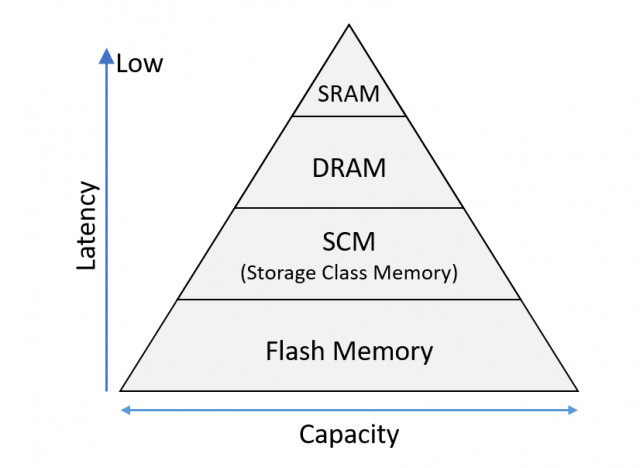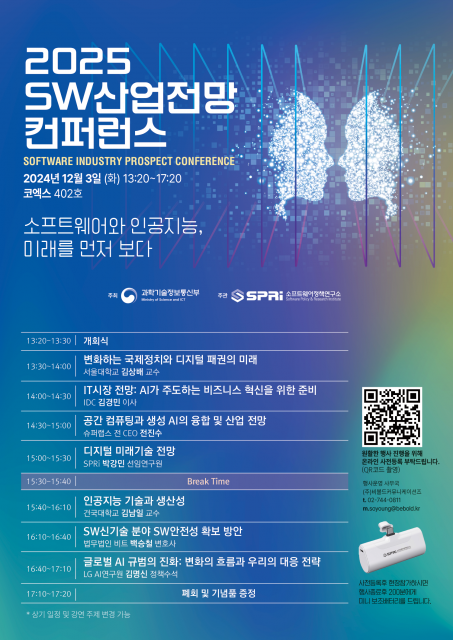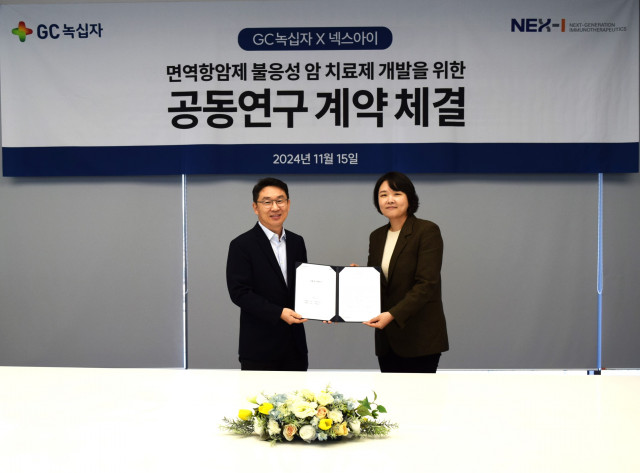 Memory Hierarchy (Graphic: Business Wire)
Memory Hierarchy (Graphic: Business Wire)
Kioxia Corporation (https://cts.businesswire.com/ct/CT?id=smartlink&url=https%3A%2F%2Fwww.kioxia.com%2Fen-jp%2Ftop.html&esheet=54138512&newsitemid=20241021336053&lan=en-US&anchor=Kioxia+Corporation&index=1&md5=3552c1d95eeee072457341c06ba9b5d0), a world leader in memory solutions, today announced that the company’s research papers have been accepted for presentation at IEEE International Electron Devices Meeting (IEDM) 2024, a prestigious international conference to be held in San Francisco, USA, from December 7th to 11th.
Kioxia is committed to the research and development of semiconductor memory, which is indispensable for the advancement of AI and the digital transformation of society. Beyond its state-of-the-art three-dimensional (3D) flash memory technology BiCS FLASH™, Kioxia excels at research in emerging memory solutions. The company is constantly striving to meet the needs for future computing and storage systems with innovative memory products.
Existing computing systems leverage DRAM, a primary memory device enabling CPU to process data swiftly, alongside flash memory for the storage of extensive data. Kioxia is spearheading research and development for Storage Class Memory (SCM), a memory solution positioned between DRAM and flash memory in the semiconductor memory hierarchy, designed to handle larger data volumes than DRAM and at higher speed than flash memory.
At IEDM, Kioxia will unveil cutting edge technologies tailored to each of these three semiconductor memory layers: (1) a new type of DRAM utilizing oxide semiconductors with a focus on reducing power consumption, (2) MRAM suitable for larger capacities for SCM application, and (3) a novel structure of 3D flash memory with superior bit density and performance.
Emerging Memory Technologies:
1. Oxide-Semiconductor Channel Transistor DRAM (OCTRAM) : This technology was jointly developed by Nanya Technology and Kioxia Corporation. The companies developed a vertical transistor that enhances circuit integration by improving the manufacturing process. The companies achieved extremely low current leakage by bringing out the properties of the transistor using an oxide-semiconductor. This can potentially lower power consumption in a wide range of applications, including AI and post-5G communication systems, and IoT products.
Paper Title: Oxide-semiconductor Channel Transistor DRAM (OCTRAM) with 4F2 Architecture (https://cts.businesswire.com/ct/CT?id=smartlink&url=https%3A%2F%2Fiedm24.mapyourshow.com%2F8_0%2Fsessions%2Fsession-details.cfm%3FScheduleID%3D340&esheet=54138512&newsitemid=20241021336053&lan=en-US&anchor=Oxide-semiconductor+Channel+Transistor+DRAM+%28OCTRAM%29+with+4F2+Architecture&index=2&md5=119f4d9c3201cf831df8a89904a075f5) (Paper Number: 6-1)
2. High-Capacity Crosspoint MRAM Technology: This technology was jointly developed by SK hynix Inc. and Kioxia Corporation. With this technology, the companies achieved cell read/write operation at the smallest-ever scale of cell half-pitch of 20.5 nanometers for MRAM by combining cell technology that pairs selectors suitable for large capacities with magnetic tunnel junctions, and applied fine processing technology for crosspoint-type arrays. Memory reliability tends to degrade as cells are miniaturized. The companies developed a potential solution by utilizing a new readout method that leverages the transient response of selectors and by reducing the parasitic capacitance of readout circuits. This technology has practical applications for AI and big data processing.
Paper Title: Reliable memory operation with low read disturb rate in the world smallest 1Selector-1MTJ cell for 64 Gb cross-point MRAM (https://cts.businesswire.com/ct/CT?id=smartlink&url=https%3A%2F%2Fiedm24.mapyourshow.com%2F8_0%2Fsessions%2Fsession-details.cfm%3FScheduleID%3D150&esheet=54138512&newsitemid=20241021336053&lan=en-US&anchor=Reliable+memory+operation+with+low+read+disturb+rate+in+the+world+smallest+1Selector-1MTJ+cell+for+64+Gb+cross-point+MRAM&index=3&md5=1d328cbb8784d9b383b26d43a971c572) (Paper Number: 20-1)
3. Next-Generation 3D Memory Technology with Horizontal Cell Stacking Structure: Kioxia developed a new 3D structure to improve reliability and prevent degradation of NAND-type cell performance. Degradation of performance typically occurs when the number of stacked layers increases in conventional structures. The new structure arranges NAND-type cells horizontally by stacking them compared to the conventional structure of vertically arranging NAND-type cells. This structure allows for the realization of 3D flash memory with high bit density and reliability at low cost.
Paper Title: Superior Scalability of Advanced Horizontal Channel Flash For Future Generations of 3D Flash Memory (https://cts.businesswire.com/ct/CT?id=smartlink&url=https%3A%2F%2Fiedm24.mapyourshow.com%2F8_0%2Fsessions%2Fsession-details.cfm%3FScheduleID%3D229&esheet=54138512&newsitemid=20241021336053&lan=en-US&anchor=Superior+Scalability+of+Advanced+Horizontal+Channel+Flash+For+Future+Generations+of+3D+Flash+Memory&index=4&md5=2040074eedda30b417013af39bb586e9) (Paper Number: 30-1)
For more details on IEDM, please visit: https://www.ieee-iedm.org/
Under its mission of “uplifting the world with ‘memory’”, Kioxia aims to pioneer a new era with memory technology and will continue to promote research and technological development to support the future of digital society.
This announcement has been prepared to provide information on our business and does not constitute or form part of an offer or invitation to sell or a solicitation of an offer to buy or subscribe for or otherwise acquire any securities in any jurisdiction or an inducement to engage in investment activity nor shall it form the basis of or be relied on in connection with any contract thereof.
Information in this document, including product prices and specifications, content of services and contact information, is correct on the date of the announcement but is subject to change without prior notice.
About Kioxia
Kioxia is a world leader in memory solutions, dedicated to the development, production and sale of flash memory and solid-state drives (SSDs). In April 2017, its predecessor Toshiba Memory was spun off from Toshiba Corporation, the company that invented NAND flash memory in 1987. Kioxia is committed to uplifting the world with memory by offering products, services and systems that create choice for customers and memory-based value for society. Kioxia's innovative 3D flash memory technology, BiCS FLASH™, is shaping the future of storage in high-density applications, including advanced smartphones, PCs, SSDs, automotive and data centers.
View source version on businesswire.com: https://www.businesswire.com/news/home/20241021336053/en/
 인공지능·디지털 시대 주도하는 것은 바로 데이터… 12월 9일~12일 ‘2024 데이터 진흥주간’ 개최
과학기술정보통신부(장관 유상호)가 주최하고 한국데이터산업진흥원과 한국지능정보사회진흥원이 주관하며, 한국데이터산업협회와 한국정보통신진흥협회가 후원하는 ‘2024 데이터 진흥주간’ 행사가 12월 9일에서 12월 12일까지 4일간 개최한다. ‘2024 데이터 진흥주간’에서는 데이터 기반의 AI 혁신을 통한 미래사회를 전망하고 데이터와 인공지능(AI), 그리고 가치를 주제로 해 다채로운 행사가 개최되며, 데이터와 AI와의 연결성을 강조하고 데이터의 자산적 가치를 기업과 전문가, 청년 등 국내에 확산시키기 위해 모두가 참여할 수 있는 장을
인공지능·디지털 시대 주도하는 것은 바로 데이터… 12월 9일~12일 ‘2024 데이터 진흥주간’ 개최
과학기술정보통신부(장관 유상호)가 주최하고 한국데이터산업진흥원과 한국지능정보사회진흥원이 주관하며, 한국데이터산업협회와 한국정보통신진흥협회가 후원하는 ‘2024 데이터 진흥주간’ 행사가 12월 9일에서 12월 12일까지 4일간 개최한다. ‘2024 데이터 진흥주간’에서는 데이터 기반의 AI 혁신을 통한 미래사회를 전망하고 데이터와 인공지능(AI), 그리고 가치를 주제로 해 다채로운 행사가 개최되며, 데이터와 AI와의 연결성을 강조하고 데이터의 자산적 가치를 기업과 전문가, 청년 등 국내에 확산시키기 위해 모두가 참여할 수 있는 장을
 2024년12월3일 / 소프트웨어정책연구소, 2025 SW산업전망 컨퍼런스 개최
소프트웨어정책연구소(소장 김형철, 이하 SPRi)는 12월 3일(화) 서울 코엑스 402호에서 ‘2025 SW산업전망 컨퍼런스’를 개최한다고 밝혔다. 과학기술정보통신부가 주최하고 SPRi가 주관하는 ‘2025 SW산업전망 컨퍼런스’는 ‘소프트웨어와 인공지능, 미래를 먼저 보다’를 주제로 국내 및 글로벌 SW산업과 SW시장을 전망해 국내 산·학·연·관 소속 기관들의 전략 및 정책 수립을 지원하는 자리가 될 전망이다. 본 컨퍼런스는 국내 다양한 분야의 소프트웨어 전문가들이 진행하며, 1부 전망 세션에선 4개의 강연이, 2부 전문 세션에
2024년12월3일 / 소프트웨어정책연구소, 2025 SW산업전망 컨퍼런스 개최
소프트웨어정책연구소(소장 김형철, 이하 SPRi)는 12월 3일(화) 서울 코엑스 402호에서 ‘2025 SW산업전망 컨퍼런스’를 개최한다고 밝혔다. 과학기술정보통신부가 주최하고 SPRi가 주관하는 ‘2025 SW산업전망 컨퍼런스’는 ‘소프트웨어와 인공지능, 미래를 먼저 보다’를 주제로 국내 및 글로벌 SW산업과 SW시장을 전망해 국내 산·학·연·관 소속 기관들의 전략 및 정책 수립을 지원하는 자리가 될 전망이다. 본 컨퍼런스는 국내 다양한 분야의 소프트웨어 전문가들이 진행하며, 1부 전망 세션에선 4개의 강연이, 2부 전문 세션에
 ‘럽 LLUBB’ 소개팅앱, 인스타그램 기능 적용으로 새로운 환경을 선보이다
모바일 애플리케이션 전문 개발 회사인 주식회사 럽은 크리스마스 한달을 앞둔 11월 29일(금) 새로운 개념의 데이팅·소개팅 앱을 출시한다. 기존의 데이팅앱의 정형화된 서비스에서 한 걸음 발전된 서비스로 구성된 ‘럽(LLUBB)’은 기존 데이팅앱 시장에 새로운 다크호스로 부상될 것으로 기대된다. 데이팅·소개팅앱 럽(LLUBB)은 매일 맞춤형 이성 추천 기능으로 회원의 기본 정보와 추가정보를 분석해 맞춤형으로 이성을 추천하므로 매칭이 진행될수록 자신과 가장 맞는 이성을 만날 수 있는 확률이 올라가는 서비스를 제공한다. 기존의 데이팅앱은
‘럽 LLUBB’ 소개팅앱, 인스타그램 기능 적용으로 새로운 환경을 선보이다
모바일 애플리케이션 전문 개발 회사인 주식회사 럽은 크리스마스 한달을 앞둔 11월 29일(금) 새로운 개념의 데이팅·소개팅 앱을 출시한다. 기존의 데이팅앱의 정형화된 서비스에서 한 걸음 발전된 서비스로 구성된 ‘럽(LLUBB)’은 기존 데이팅앱 시장에 새로운 다크호스로 부상될 것으로 기대된다. 데이팅·소개팅앱 럽(LLUBB)은 매일 맞춤형 이성 추천 기능으로 회원의 기본 정보와 추가정보를 분석해 맞춤형으로 이성을 추천하므로 매칭이 진행될수록 자신과 가장 맞는 이성을 만날 수 있는 확률이 올라가는 서비스를 제공한다. 기존의 데이팅앱은
 GC녹십자, 넥스아이와 면역항암제 혁신 신약 공동개발
GC녹십자(GC Biopharma)는 기존 면역항암제에 불응하는 환자들을 치료하기 위한 혁신 신약(first-in-class) 개발을 목표로 넥스아이(NEX-I)와 공동개발 계약을 체결했다고 18일 밝혔다. 이번 협력은 넥스아이의 종양미세환경 내 불응성 인자 발굴 플랫폼과 GC녹십자의 고유 항체 개발 기술을 결합해 새로운 항암 치료 옵션을 제공하기 위한 것으로, 양사는 항체 기반 치료제 개발을 위한 후보물질 도출부터 개발 전 과정을 포괄하는 협력관계를 구축하게 된다. 면역항암제는 환자의 미세종양환경 내 면역세포가 암세포를 공격해 암
GC녹십자, 넥스아이와 면역항암제 혁신 신약 공동개발
GC녹십자(GC Biopharma)는 기존 면역항암제에 불응하는 환자들을 치료하기 위한 혁신 신약(first-in-class) 개발을 목표로 넥스아이(NEX-I)와 공동개발 계약을 체결했다고 18일 밝혔다. 이번 협력은 넥스아이의 종양미세환경 내 불응성 인자 발굴 플랫폼과 GC녹십자의 고유 항체 개발 기술을 결합해 새로운 항암 치료 옵션을 제공하기 위한 것으로, 양사는 항체 기반 치료제 개발을 위한 후보물질 도출부터 개발 전 과정을 포괄하는 협력관계를 구축하게 된다. 면역항암제는 환자의 미세종양환경 내 면역세포가 암세포를 공격해 암
 ‘현장에서 미술하는 작가’ 전진경의 신간 ‘수요일마다 그림 그리러 가겠다고 말했다’
알록출판사가 예술가 전진경 작가의 신간 ‘수요일마다 그림 그리러 가겠다고 말했다’를 펴냈다. 예술과 노동, 아름다움과 쓸모, 이웃과 연대의 경계를 묻는 그림 기록 부당 해고에 저항한 노동자들에 대한 존경과 애도 기억과 행동이 담긴 예술의 다정한 인사 사뭇 압도적이다. 이 책은 어둠처럼 길고 깊은 싸움의 한복판으로 우리를 이끈다. 그러나 그 사이사이마다 먹먹하고 아름답고 고요한 것들이 나직하게 반짝이고 있어서 이 시간이 빨리 끝나기를, 하지만 계속되기를 바라는 마음으로 천천히 책장을 넘기게 된다. - 김현호 (사진비평가, 보스토크
‘현장에서 미술하는 작가’ 전진경의 신간 ‘수요일마다 그림 그리러 가겠다고 말했다’
알록출판사가 예술가 전진경 작가의 신간 ‘수요일마다 그림 그리러 가겠다고 말했다’를 펴냈다. 예술과 노동, 아름다움과 쓸모, 이웃과 연대의 경계를 묻는 그림 기록 부당 해고에 저항한 노동자들에 대한 존경과 애도 기억과 행동이 담긴 예술의 다정한 인사 사뭇 압도적이다. 이 책은 어둠처럼 길고 깊은 싸움의 한복판으로 우리를 이끈다. 그러나 그 사이사이마다 먹먹하고 아름답고 고요한 것들이 나직하게 반짝이고 있어서 이 시간이 빨리 끝나기를, 하지만 계속되기를 바라는 마음으로 천천히 책장을 넘기게 된다. - 김현호 (사진비평가, 보스토크

 1200년 전의 교훈
1200년 전의 교훈
 피플스토리 창간인사 드립니다
피플스토리 창간인사 드립니다

 목록
목록












